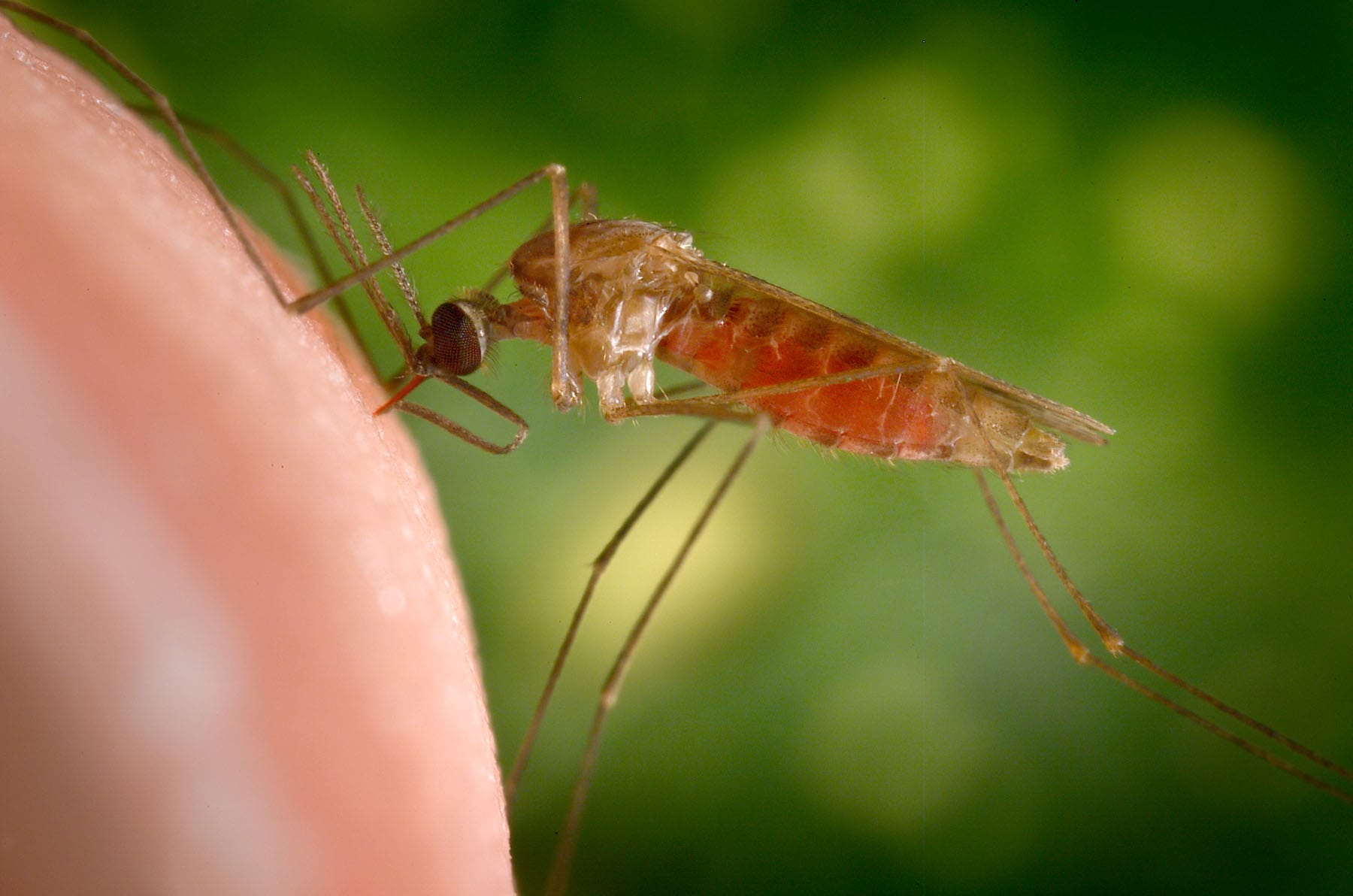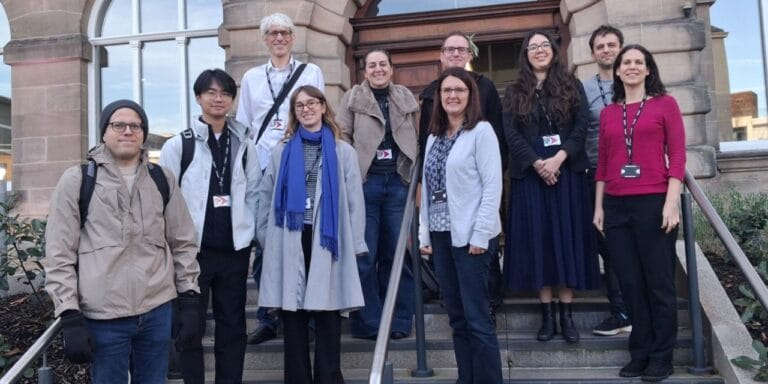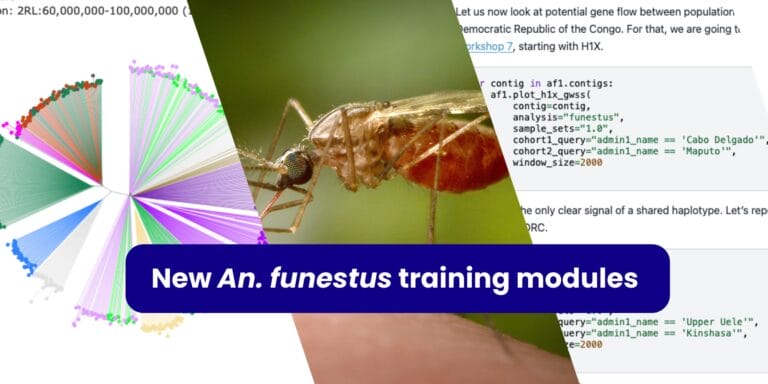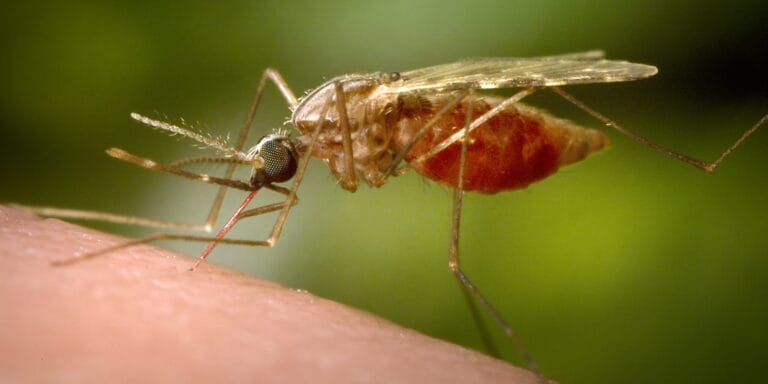Malaria Vector Genome Observatory
The Malaria Vector Genome Observatory is a collaborative effort to sequence the genomes of thousands of Anopheles mosquitoes and use those data to improve malaria control. We focus on those species that act as human malaria vectors.

The Observatory is made up of several projects, each focused on different areas of vector mosquito genomics. All of the projects generate accessible, high-throughput data, as well as tools and training that support malaria researchers and public health data analysts.
- ANOSPP (ANOpheles SPecies Plasmodium) - Targeted sequencing to identify Anopheles species and Plasmodium carriers
- Anopheles gambiae genomic surveillance - Whole-genome sequencing for surveillance of mosquitoes in the An. gambiae species complex
- Anopheles funestus genomic surveillance - Whole-genome sequencing for surveillance of An. funestus mosquitoes
- Anopheles darlingi genomic surveillance - Whole-genome sequencing for surveillance of An. darlingi mosquitoes
- Vector Observatory - Asia - Whole-genome sequencing to investigate the population structure and diversity of malaria vectors in Asia
The Pan-African Mosquito Control Association (PAMCA) and MalariaGEN collaboration spans the genomic surveillance projects with the aim of establishing a new programme of genomic research and data generation on African malaria vectors.
These projects build on the foundations of the Ag1000G project, which is now complete.
Why we need genomic surveillance of malaria vectors
Vector control (ie stopping or killing mosquitoes) has played a major role in reducing the burden of malaria in Africa, through the use of long-lasting insecticidal nets (LLINs) and indoor residual spraying of insecticides (IRS). But since 2015, progress towards malaria elimination has stalled.
The reasons for this stalling in progress are complex and not fully understood, but there are several biological threats which are playing a part. In particular, resistance to insecticides is now widespread among major African malaria vectors, limiting the efficacy of LLINs and IRS. There are also settings where we still don't have a clear picture of which mosquito species are responsible for malaria transmission, and where a different approach to malaria vector control may be needed.
In response to these challenges, malaria vector control in Africa is going through a period of major change, as new insecticides are being brought into public health use through a new generation of LLIN and IRS products. These new vector control tools are currently effective, but we know based on past experience that mosquitoes will evolve resistance, and so without preemptive action, these tools will not remain effective for long.
Enhanced sentinel surveillance of major vector populations is essential during this period of change, to provide early warning of new insecticide resistance adaptations, and to help understand where these new vector control products are most effective.
We must improve our ability to identify and survey the full range of mosquito species responsible for malaria transmission. We also need to improve our understanding of how transmission is varying over time and space. Combining data on mosquito populations, vector control strategies, and malaria transmission will give us the evidence we need to tailor vector control strategies to different settings.
High-throughput genome sequencing for vector surveillance
The Vector Observatory projects all use the latest genome technology to track mosquito evolution. Tools like targeted sequencing and whole-genome sequencing complement and enhance existing surveillance programs.
- Targeted sequencing - The ANOSPP project is developing a new targeted sequencing technology which can simultaneously identify any species of Anopheles mosquito and determine whether it is carrying malaria parasites. This technology is cheap and highly scalable, and the project aims to sequence hundreds of thousands of mosquitoes over the next five years to build up a comprehensive data resource on malaria vector species distributions, ecology and vectorial capacity.
- Whole-genome sequencing - When new insecticides are introduced for malaria vector control, it isn't always possible to predict which genes or mutations will evolve in response. Whole-genome sequencing provides a solution, enabling detection of significant changes occurring anywhere within the mosquito genome. The Anopheles gambiae genomic surveillance project, the Anopheles funestus genomic surveillance project, the Anopheles darlingi genomic surveillance project and the Vector Observatory Asia project are all using whole-genome sequencing to monitor populations of major malaria vectors.
Accessible open data resources
Genome sequencing at this scale generates huge amounts of data, which can be technically challenging to store, access and analyse. To overcome this, we are using cloud computing to build a genomic data repository that can be accessed from anywhere in the world.
Our data release policies are designed to be equitable and appropriate. We try to balance the interests of those who contribute specimens, data and expertise, with the needs of the public health practitioners who must respond to emerging biological threats.
Alongside the technical tools, we are developing educational materials and hands-on training programmes to build skills in genomic surveillance data analysis.
To find out more about accessing data from the Vector Observatory, visit the MalariaGEN Vector Data User Guide
Collaborate with us
The Vector Observatory is a global collaborative effort with those in malaria-endemic countries at the core, actively collecting mosquitoes as part of their research or routine entomological surveillance work enabling the generation of large amounts of genomics data.
The projects of the Vector Observatory are open to new partnerships with malaria researchers and control programmes. If you are interested in partnering with a project please refer to our guide for mosquito partner studies or see the individual project pages.
Collaborate with us
 The projects of the Vector Observatory are open to new partnerships with malaria researchers and control programmes. If you are interested in partnering with a project, please get in touch with the project's contact person or see our guide for mosquito partner studies.
The projects of the Vector Observatory are open to new partnerships with malaria researchers and control programmes. If you are interested in partnering with a project, please get in touch with the project's contact person or see our guide for mosquito partner studies.
Contributing mosquito projects
Anopheles funestus genomic surveillance project
Using whole-genome sequencing for enhanced monitoring and surveillance of the major African malaria vector Anopheles funestus.
Anopheles darlingi genomic surveillance project
Using whole-genome sequencing for enhanced monitoring and surveillance of the malaria vector Anopheles darlingi.
Ag1000G is an international collaboration using whole genome deep sequencing to provide a high-resolution view of genetic variation in natural populations of Anopheles gambiae, the principal vector of Plasmodium falciparum malaria in Africa.
Anopheles gambiae genomic surveillance project
Using whole-genome sequencing for enhanced monitoring and surveillance of major malaria vectors in the Anopheles gambiae species complex.
Genomic Surveillance Hubs in West Africa (NIHR Global Health Research Group)
Malaria is one of the greatest public health challenges facing countries in West Africa. It is responsible for hundreds of thousands of deaths every year and disproportionately affects children in this region of the world. By better understanding the genomic landscape of malaria parasites and vectors in this region, National...
PAMCA-MalariaGEN collaboration
Funded by the Bill and Melinda Gates Foundation and led by The Pan-African Mosquito Control Association (PAMCA), this collaboration aims to establish a new programme of genomic research and data generation on African malaria vectors.
Pan-African Malaria Genetic Epidemiology Network (PAMGEN)
This project aims to create a robust network of African scientists – within and outside Africa– in collaboration with leading researchers around the world, who use the latest genetics and genomics science to contribute towards malaria elimination efforts in Africa. By combining data from across the continent and from across...
Vector Observatory - Asia connects research groups that are investigating the population structure and diversity of malaria vectors in Asia. This centres on multiple vectors from the Greater Mekong Subregion in Southeast Asia, where drug-resistant malaria parasites are emerging and spreading. This research is expanding the range of mosquito species...
Publications
- Genomic diversity of the African malaria vector Anopheles funestus
Boddé et alScience, 2025; 389, 6766- Genomic evidence of spatially structured gene flow and divergent insecticide resistance backgrounds of the malaria vector Anopheles funestus in Tanzania
Odero et alGenetics, 2025; 230, 4- On the use of generative models for evolutionary inference of malaria vectors from genomic data
Eneli et albioRxiv, 2025;



